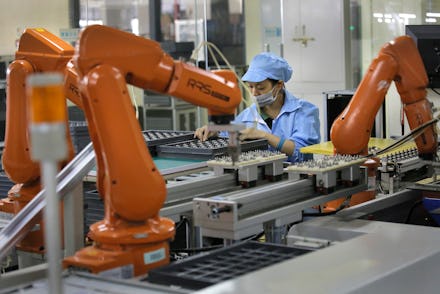Even Big Banks Think Robot Automation Will Lead to Further Income Inequality

There is a creeping horror on the economic horizon that seeps in further and further every time we catch word of what technology holds in store, whether it's cars that drive themselves or a robot performing surgery — the fear that pretty soon, we're all going to be out of jobs. The question is, what will the economy look like once it does?
For years, economists and tech gurus have been saying that robot automation will take our current income inequality issues and amplify them exponentially and now, even major banks are saying so. A recent report from Bank of America Merrill Lynch included a section on "creative disruption," or exciting fields in technology like connected devices, which they project will be a $7 trillion market within the decade.
But the report warns that while there are tons of thrilling investment opportunities, in areas like clean technology and online services, there's just one problem: Technological unemployment and robot automation is going to kill jobs (they use Oxford's famous 45%-of-all-jobs figure) and when they do, the lost wealth will end up in the hands of the already powerful.
"The greater challenge is how creative disruption can give rise to winner-take-all and monopolistic outcomes," the report says. "These can actually create incentives for entrenched incumbents to spend more effectively defending their monopoly rents than to innovate further."
In other words, when a job is replaced by a robot, all of the wages go into the robot-owner's pocket, instead of back out into the world of consumer goods where the worker takes his check. nce that kind of centralization of power and wealth occurs, you're left with self-defensive monarchs instead of a competitive ecosystem — the exact reason we avoid monopolies in the first place.
"The first to market may benefit from sizable first-mover advantages that create strong network effects for the first, rather than the best, technology," the reports says.
It only takes one look at Google to see how a technology that seems plucky and disruptive can quickly create an incumbency that leaves little room for even a single serious competitor.
Maybe this time it's different: Most people agree that technological unemployment is coming, and even that it could lead to further income inequality. The counter-argument typically goes like this: New technologies always kill jobs, but new kinds of technology means all of those people will just becoming employed in new kinds of careers that didn't exist previously.
"The transitions from agriculture to manufacturing, and then manufacturing to services, were feared by some to result in mass unemployment," the report says. "What happened instead is that some old jobs gradually disappeared as technological progress supplanted them, while new — often unanticipated — jobs arose in their place."
But there are technologists and scholars who believe that this time around, this rapid dissolve of jobs is one we won't be bouncing back from. The kinds of jobs we're automating aren't just mechanical or menial — they're jobs that are the purview of the human intellect, like medical professionals, accountants and human resources professionals.
"All of the predictions that technology would eliminate jobs have always been wrong," professor Karl Widerquist of Georgetown University told Mic last month. "But it doesn't mean they always will be wrong. More technology always meant more jobs for horses, then suddenly in 1930, they were almost totally unemployed. Something like that could happen with human labor."
For those that see the labor cataclysm on the horizon, the solutions range from something like universal basic income to progressive taxation. Unsurprisingly, most robust solutions (that don't involve just ignoring the problem) involve somehow taking money away from the rich.